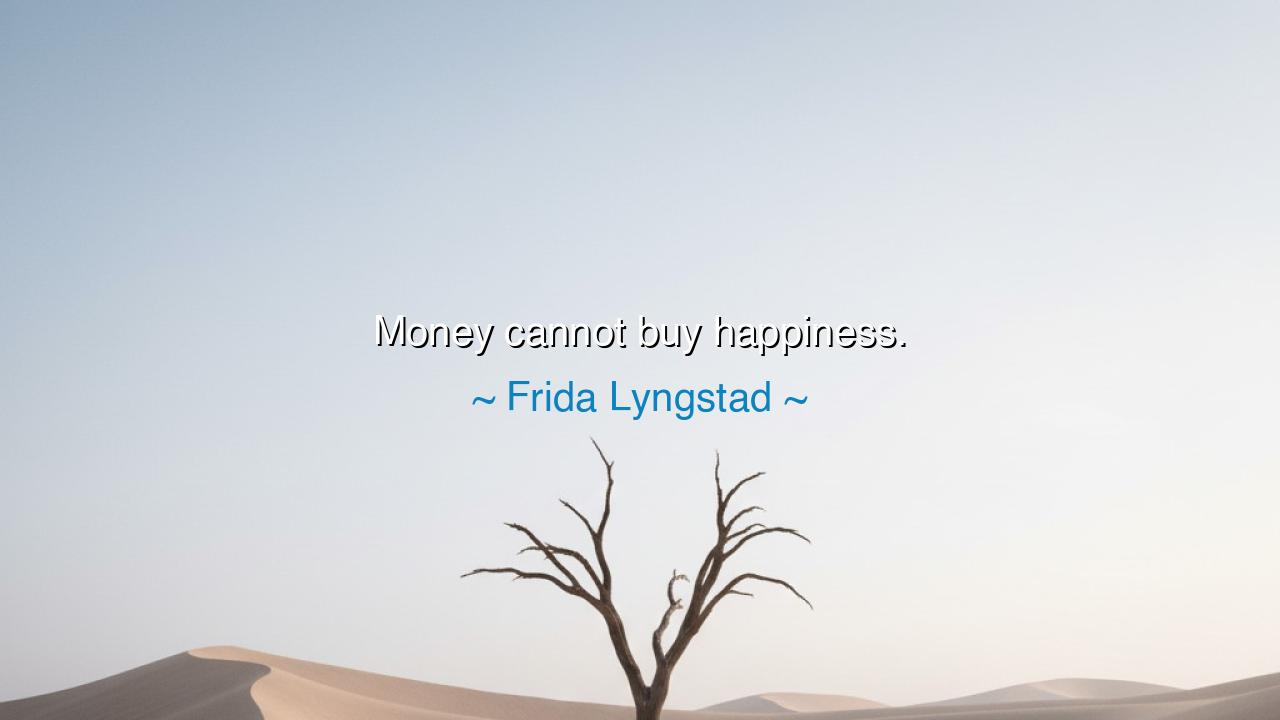
Money cannot buy happiness.






In the words of Frida Lyngstad, “Money cannot buy happiness.” These words, though simple, carry the weight of centuries — a truth so often spoken and yet so rarely understood. For Frida, one of the legendary voices of ABBA, fame and fortune were not abstract dreams; they were lived realities. She stood at the summit of worldly success, surrounded by lights, applause, and wealth — and yet, she discovered what the wise of every age have taught: that true happiness is not a thing that can be purchased, nor a possession that can be owned. It is a state of being, born from within, untouched by gold or silver.
When Frida spoke those words, they were not the idle musings of someone untouched by desire, but the confession of one who had tasted all that the world could offer and found its sweetness fleeting. The origin of her quote lies not in poverty, but in abundance. Like many before her, she saw that money, though it brings comfort and freedom, cannot soothe the ache of the spirit nor fill the hidden emptiness of the heart. It can build a palace, but not a home; it can purchase luxury, but not peace. It can command admiration, but never love.
The ancients knew this truth long before the modern world learned to measure happiness in coins. The Stoic philosopher Seneca, surrounded by the opulence of Rome, wrote that “wealth consists not in having great possessions, but in having few wants.” For even emperors, though robed in splendor, lay awake at night in anxiety, while a peasant, content beneath the stars, slept in serenity. Likewise, the Buddha, born a prince amid luxury, abandoned his palace when he realized that pleasure and power were but mirages on the desert of desire. He sought not gold, but awakening — not comfort, but truth — and in that search, he found a joy that no coin could ever buy.
Consider, too, the tale of King Midas, who begged the gods that all he touched turn to gold. At first, he rejoiced, surrounded by glittering wealth beyond measure. But soon, he discovered the curse of his wish — his food turned to metal, his daughter to stone, and his joy to despair. The myth of Midas is no mere fable; it is the eternal reflection of humanity’s folly — to seek happiness through possession rather than presence, to value the glitter of gold above the warmth of a heartbeat. Frida’s words echo this same warning: that wealth without wisdom leads only to emptiness.
Yet her saying does not condemn money itself, but rather the illusion of its power. Money is a tool — useful, necessary, and even noble when used rightly — but it is not the master of joy. The danger lies not in possession, but in attachment. When one’s peace depends upon the weight of their purse, it will vanish as swiftly as fortunes rise and fall. Happiness, on the other hand, is born of gratitude, of love freely given and received, of purpose that endures beyond material gain. The rich and the poor alike may possess it, for it grows not in the soil of wealth, but in the garden of the soul.
And what, then, should we learn from these words? That we must seek first the riches of the heart — compassion, friendship, meaning — and let money serve, not rule. To live wisely is to hold wealth lightly, to enjoy it without being enslaved by it. Let your treasure be in your deeds, your art, your kindness; for these cannot be stolen nor diminished by time. When you earn, give; when you possess, share; when you desire, ask whether the object of your longing will feed the body or the spirit. Only the latter will satisfy.
Thus, remember, O listener: happiness is not a purchase, but a practice. It is cultivated in the quiet moments, in the laughter of loved ones, in the work that gives your life meaning. Frida Lyngstad, who sang before millions, reminds us that even under the brightest lights, one must turn inward to find peace. Money may open doors, but only the heart can open heaven. Live not as one who chases wealth, but as one who creates joy — and in doing so, you will possess a fortune that neither moth nor rust can destroy.






AAdministratorAdministrator
Welcome, honored guests. Please leave a comment, we will respond soon